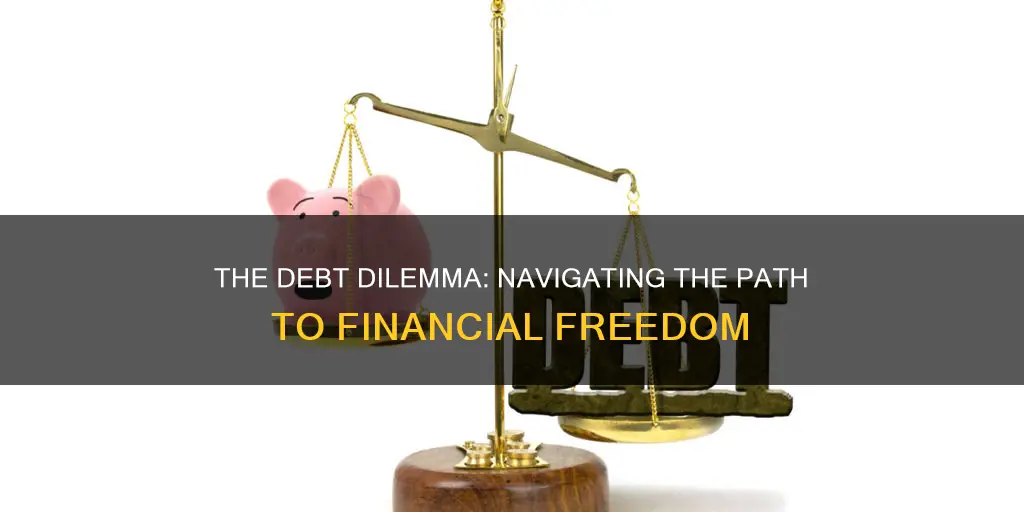
Whether to pay down debt or invest is a common dilemma, and the answer depends on a number of factors. Both are worthy goals, and it is possible to do both at the same time. However, if you are only able to choose one, it is generally recommended to first pay down any high-interest debt, such as credit card debt, and then focus on investing. This is because high-interest debt can be costly over time and may cause financial strain, whereas investing often comes with increased risk and volatile returns.
However, it is important to also consider your personal financial situation, risk tolerance, and investment goals when making this decision. For example, if you have a low-interest loan or credit card, you may be better off investing your money if you expect to earn a higher return. Additionally, investing early and often can have benefits due to compounding interest. Therefore, it is essential to weigh the pros and cons of each option and decide which strategy aligns best with your financial goals and risk appetite.
| Characteristics | Values |
|---|---|
| Interest rate on debt | If the interest rate on your debt is 6% or more, it is generally better to pay down debt before investing. |
| Interest rate on investments | If you can earn more interest on your investments than your debts are costing you, it makes sense to invest. |
| Credit score | Paying off debt can improve your credit score, which is important if you want to borrow money in the future. |
| Risk tolerance | If you are comfortable taking the risk that your investments will fluctuate with the market, investing may be a good option. |
| Retirement timeline | It is generally best to avoid bringing debt into retirement, so consider your timeline when deciding whether to pay off debt or invest. |
| Emergency fund | It is recommended to have an emergency fund before investing or paying off debt, to avoid racking up more debt in the case of unexpected expenses. |
| Company retirement plan matches | Many companies offer to match a percentage of retirement plan contributions, so it is important to consider this when deciding whether to pay off debt or invest. |
| High-interest debt | High-interest credit card debt can be costly and difficult to pay off, so it may be better to focus on eliminating this type of debt before investing. |
| Tax incentives | Some types of interest, such as student loans or mortgages, may offer tax incentives, which can impact your decision. |
What You'll Learn

The pros of paying off debt first
- Improved cash flow: Paying off debt can free up cash flow, allowing you to achieve other financial goals and improve your quality of life.
- Reduced interest payments: By paying off debt, you will no longer have to worry about paying interest, which can save you money in the long run.
- Improved financial security: Getting rid of debt can help secure your finances for the future, allowing you to put money into an emergency fund or retirement account.
- Improved credit score: Paying off debt can boost your credit score, especially if you focus on debts with high credit utilization rates, such as credit cards.
- Peace of mind: Eliminating debt can alleviate the stress associated with owing money and improve your overall financial peace of mind.
- Increased financial freedom: Clearing debt can give you extra financial freedom, allowing you to make major purchases or save more.
Elon Musk's Current Investment Focus
You may want to see also

Investing early and often
Another reason to invest early is the tax benefits associated with certain types of investments. For example, student loan interest and mortgage loan interest are tax-deductible, reducing your taxable income for the year. Additionally, investing in stocks, mutual funds, or other investments could outweigh the interest paid on your debt if the market is performing well.
However, investing early is not without its risks. Investments can be volatile, and the stock market may be up one year and down the next. While there are investments that offer guaranteed interest rates, such as bank certificates of deposit (CDs) and U.S. Treasury bills, they tend to have low rates of return that rarely exceed the interest rates charged by credit card companies and other lenders.
Therefore, it is essential to consider your risk tolerance when deciding whether to invest early. If you are comfortable with the potential ups and downs of the market, investing early can be a great way to build wealth over time. However, if you are risk-averse or losing sleep over your debts, you may be better off prioritising paying down your debt first.
Popular Financial Assets to Invest In
You may want to see also

When to invest before paying off debt
Secondly, consider the tax implications. Some types of interest, like student loans or mortgages, may offer tax incentives depending on your income. In such cases, investing first might be more advantageous. However, it is essential to consult a tax professional for guidance on these more complex scenarios.
Thirdly, assess your risk tolerance and personal feelings. Investing in the stock market can be volatile, and you may be comfortable taking the gamble that your investments will fluctuate with the market. On the other hand, if the weight of debt keeps you awake at night, there is nothing wrong with prioritising paying it down sooner, as you can't put a price on your peace of mind.
Finally, it is worth noting that you may not have to choose exclusively between investing and paying off debt. A hybrid approach that balances both can help you achieve short-term and long-term financial goals. This method is recommended by most experts and allows you to adjust your strategy as your financial situation evolves.
Miami: A Smart Investment Move
You may want to see also

The importance of tax efficiencies
Tax efficiency is a vital consideration when deciding between paying down debt and investing. It refers to the structuring of an investment to receive the least possible taxation. There are several ways to achieve tax efficiency, and it is an important factor in financial planning.
Firstly, individuals can open income-producing accounts that are tax-deferred, such as an Individual Retirement Account (IRA) or a 401(k) plan. These accounts allow investment income to grow tax-free until withdrawals are made, providing a significant advantage over time.
Secondly, tax-efficient mutual funds are taxed at a lower rate relative to other mutual funds, making them an attractive option for reducing tax liability.
Additionally, investors can opt for municipal bonds, which are exempt from federal taxes, or choose to invest in an irrevocable trust for estate tax efficiency.
Another strategy is to hold stocks for more than a year, which qualifies for the long-term capital gains tax rate, typically lower than the ordinary income tax rate.
Furthermore, tax efficiency can be maximized by placing the right investments in the right accounts. Taxable accounts, such as brokerage accounts, are suitable for investments that tend to retain more of their returns after taxes. In contrast, tax-advantaged accounts like IRAs or 401(k)s are ideal for investments that lose more of their returns to taxes.
Finally, diversifying by tax treatment can help reduce taxes and provide flexibility in managing taxes during retirement. This involves spreading investments across accounts with different tax treatments, such as taxable brokerage accounts, tax-deferred IRAs or 401(k)s, and after-tax Roth accounts.
By considering these tax efficiency strategies, individuals can minimize their tax burden and maximize their returns, making informed decisions about paying down debt or investing.
Where to Invest: Sector Strategies
You may want to see also

How to manage debt and investing
Overview
The answer to whether you should pay down debt or invest depends on your personal circumstances. Both are worthy goals and can make sense depending on the situation. Here are some factors to consider when deciding how to manage debt and investing.
Interest rates and returns
A common rule of thumb is to compare the interest rate on your debt with the expected return on your investments. If the interest rate on your debt is higher than the expected return on your investments, it usually makes more sense to prioritise paying off the debt first. Conversely, if the expected return on your investments is higher, investing may be the better option.
However, it is important to note that forecasting precise return rates can be challenging, even for seasoned experts. Additionally, investments can be volatile, with potential gains one year and losses the next. As such, it is essential to consider your risk tolerance when making this decision.
Type of debt
Not all debt is created equal. High-interest credit card debt, for example, can be costly and challenging to pay off, so it often makes sense to prioritise eliminating this type of debt before investing. On the other hand, some types of debt, such as student loans or mortgages, may offer tax incentives, depending on your income. Consult a tax professional for guidance on these more complex situations.
Credit score
Paying off debt, especially credit card debt, can improve your credit score. A good credit score is important if you want to borrow money in the future, such as for a mortgage or car loan. It can also impact other areas of your life, such as insurance premiums, renting an apartment, or even job applications.
Retirement timeline
It is generally recommended to avoid bringing debt into retirement. Therefore, if retirement is approaching, prioritising debt repayment, especially high-interest debt, becomes more crucial. However, it is essential to balance this with continued retirement investing, especially if your employer offers matching contributions to a retirement plan.
Emergency fund
Before focusing solely on debt repayment or investing, it is crucial to have an emergency fund to cover unexpected expenses. This will help prevent you from racking up more debt in the future. Aim to save enough to cover at least three to six months' worth of expenses.
Doing both
It is possible and often recommended to do both—invest and pay down debt. This involves creating a detailed budget and setting specific financial goals. Additionally, consider increasing your income through side hustles or asking for a raise to accelerate both debt repayment and investing.
Sand Dune P250: Worth the Investment?
You may want to see also
Frequently asked questions
It depends on your circumstances. If you have high-interest debt, it's usually better to pay that off first. If you have low-interest debt, investing might be a better option.
Credit card debt is usually considered high-interest debt, with rates ranging from 16.99% to 24.37%.
By paying off high-interest debt, you can save money on interest and improve your credit score.
Investing early allows you to take advantage of compounding interest, which can help your money grow faster. Investing can also provide tax benefits, such as deductions for student loan and mortgage interest.
Yes, it is possible to do both. You can start by creating a budget and setting financial goals. You can also consider debt relief options and increasing your income through side hustles.







